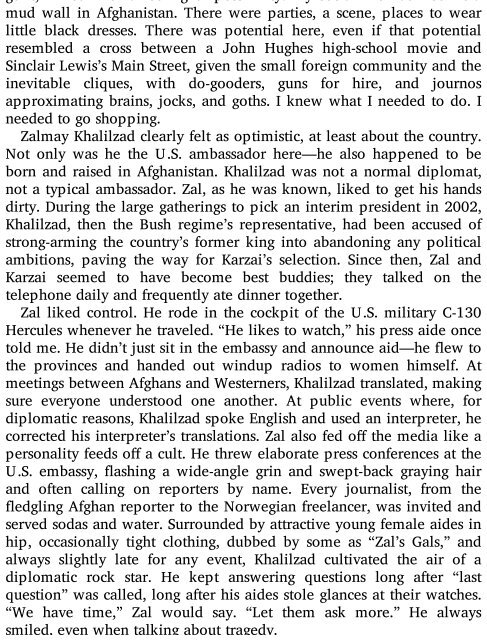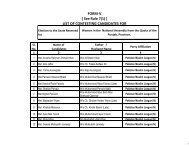the_taliban_shuffle_-_kim_barker
the_taliban_shuffle_-_kim_barker
the_taliban_shuffle_-_kim_barker
You also want an ePaper? Increase the reach of your titles
YUMPU automatically turns print PDFs into web optimized ePapers that Google loves.
guilt, mixed with a feeling of possibility. My social life had not hit a<br />
mud wall in Afghanistan. There were parties, a scene, places to wear<br />
little black dresses. There was potential here, even if that potential<br />
resembled a cross between a John Hughes high-school movie and<br />
Sinclair Lewis’s Main Street, given <strong>the</strong> small foreign community and <strong>the</strong><br />
inevitable cliques, with do-gooders, guns for hire, and journos<br />
approximating brains, jocks, and goths. I knew what I needed to do. I<br />
needed to go shopping.<br />
Zalmay Khalilzad clearly felt as optimistic, at least about <strong>the</strong> country.<br />
Not only was he <strong>the</strong> U.S. ambassador here—he also happened to be<br />
born and raised in Afghanistan. Khalilzad was not a normal diplomat,<br />
not a typical ambassador. Zal, as he was known, liked to get his hands<br />
dirty. During <strong>the</strong> large ga<strong>the</strong>rings to pick an interim president in 2002,<br />
Khalilzad, <strong>the</strong>n <strong>the</strong> Bush regime’s representative, had been accused of<br />
strong-arming <strong>the</strong> country’s former king into abandoning any political<br />
ambitions, paving <strong>the</strong> way for Karzai’s selection. Since <strong>the</strong>n, Zal and<br />
Karzai seemed to have become best buddies; <strong>the</strong>y talked on <strong>the</strong><br />
telephone daily and frequently ate dinner toge<strong>the</strong>r.<br />
Zal liked control. He rode in <strong>the</strong> cockpit of <strong>the</strong> U.S. military C-130<br />
Hercules whenever he traveled. “He likes to watch,” his press aide once<br />
told me. He didn’t just sit in <strong>the</strong> embassy and announce aid—he ew to<br />
<strong>the</strong> provinces and handed out windup radios to women himself. At<br />
meetings between Afghans and Westerners, Khalilzad translated, making<br />
sure everyone understood one ano<strong>the</strong>r. At public events where, for<br />
diplomatic reasons, Khalilzad spoke English and used an interpreter, he<br />
corrected his interpreter’s translations. Zal also fed o <strong>the</strong> media like a<br />
personality feeds o a cult. He threw elaborate press conferences at <strong>the</strong><br />
U.S. embassy, ashing a wide-angle grin and swept-back graying hair<br />
and often calling on reporters by name. Every journalist, from <strong>the</strong><br />
edgling Afghan reporter to <strong>the</strong> Norwegian freelancer, was invited and<br />
served sodas and water. Surrounded by attractive young female aides in<br />
hip, occasionally tight clothing, dubbed by some as “Zal’s Gals,” and<br />
always slightly late for any event, Khalilzad cultivated <strong>the</strong> air of a<br />
diplomatic rock star. He kept answering questions long after “last<br />
question” was called, long after his aides stole glances at <strong>the</strong>ir watches.<br />
“We have time,” Zal would say. “Let <strong>the</strong>m ask more.” He always<br />
smiled, even when talking about tragedy.



